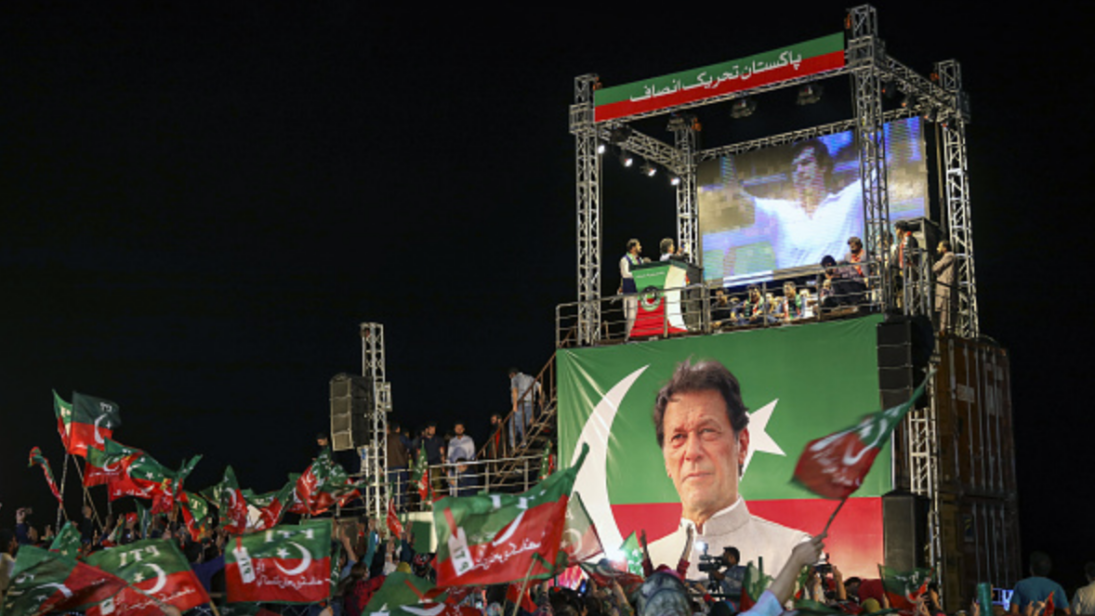
The ruling government of Pakistan dissolved the country’s parliament as a response to the opposition parties’ request for a no-confidence vote. This precipitated heavy debate about the constitutionality of this act over the past few days: Khan blamed unverified foreign conspirators for supporting the opposition against his government, immediately involving the Supreme Court of Pakistan. Imran Khan has announced fresh elections over the next few months, in hopes of regaining lost power. This political upheaval and the geopolitical dynamics that have sprung from it—especially Pakistan’s relations with competing great powers the United States, Russia, and China—put the future of Pakistan’s democratic institutions in question. Although the Supreme Court of Pakistan overruled the dissolution of assemblies, it is yet to be determined whether the government will abide by the Supreme Court’s decision.
The No-Confidence Motion and its Aftermath
The Khan government has been under immense pressure over the past couple of years, leading the opposition to motion for a no-confidence vote. A no-confidence motion checks whether the Prime Minister maintains the confidence of his parliamentarians and is fit to continue in his position. The Pakistan Democratic Movement, an amalgamation of the most powerful opposition parties in the country, had vociferously criticized Khan’s mismanagement of the economy amongst other domestic and foreign policy mishaps over the past year. The opposition—after government coalition parties broke away from the government—finally gathered enough legislators to vote against Khan in a no-confidence motion. If Imran Khan had lost the no-confidence vote, a caretaker prime minister would have been elected by the parliament to call a general election immediately. Khan’s loss of majority in the parliament all but confirmed the end to the current government. However, the political process in Pakistan never follows a straight line. In a surprising move, the Deputy Speaker of the parliament not only dismissed the no-confidence motion by invoking Article 5—based on an unverified foreign conspiracy—but also dissolved the assemblies at the request of the Prime Minister.
This political upheaval and the geopolitical dynamics that have sprung from it put the future of Pakistan’s democratic institutions in question.
The opposition cried treason, declaring the move by the Deputy Speaker to dismiss the no-confidence motion over unsubstantiated government claims inherently unconstitutional and an insult to the democratic foundations of the nation. The issue was forwarded to the Supreme Court immediately after the dissolution of the assemblies. The Supreme Court adjourned the hearing of arguments on the legality of Imran Khan’s dissolution of the assembly and the Deputy Speaker’s questionable dismissal of the no-confidence motion for a few days, engendering fears that further delays in the hearing could permanently damage Pakistan’s constitutional integrity and democratic political processes. However, despite political fragility, the Supreme Court remains intact. The Court declared Khan’s move unconstitutional and ordered a reconvening of the parliament to hold a no-confidence vote on April 9. The Judiciary stood firm to the ruling government, restoring confidence in Pakistan’s democratic institutions.
The Military’s Role in the Current Political Environment
Fears of military coups in times of political uncertainty are not unfounded in Pakistan. The political uncertainty that has plagued Pakistan since it became apparent that Imran Khan lost majority support in the parliament fueled concerns of military involvement. Imran Khan’s government, popularly seen as a military prop, has strained relations with arguably the strongest institution in the country. From disagreeing on the next intelligence chief’s appointment to disputing Pakistan’s official foreign policy stances, the Chief of Army Staff General Qamar Bajwa has noticeably lost faith in the government. His statements at the Islamabad Security Dialogue less than 24 hours before the dissolution, emphasizing the importance of sustaining and improving relations with the United States and condemning the Russian invasion of Ukraine, stood in sharp contrast to Imran Khan’s lambasting of the opposition as part of a conspiracy bankrolled by the United States and visiting Russia in February a few hours after Russia had announced the invasion of Ukraine.
Despite the dissolution of assemblies, calls for general elections, and the absence of a caretaker government, the military has, for now, stepped back. A military coup is unlikely simply because the military does not see the benefits of coming to power. It will be interesting to observe whether Bajwa’s term is extended in November. However, continuing political uncertainty would only entice the military to take the helm.

Geopolitical Concerns
As recently as February, Khan rejected claims of “camp politics” and asserted strategic cooperation with all partners, including the United States, China, and Russia. However, Khan’s visit to Russia signaled a realignment of Pakistan’s foreign policy. The China-Pakistan relationship has often been perceived as a threat to U.S.-Pakistan relations, but a Putin-Khan meeting could break ties beyond the point of repair. The final nail in the coffin in the U.S.-Pakistan relationship could very well be Khan’s anti-U.S. rhetoric, which has accelerated over the past week.
The dissolution of the Pakistani parliament—the core of its democratic foundation—over an alleged U.S.-led foreign conspiracy could permanently alter any future attempts at normalizing U.S.-Pakistan relations. The United States has emphatically dismissed claims of foreign meddling in Pakistan’s politics. Nonetheless, anti-U.S. rhetoric, despite its mendacity, has mobilized his base, invigorating the susceptible and highly patriotic sections of the population that brought Imran Khan to power in the first place.
The dissolution of the Pakistani parliament—the core of its democratic foundation—over an alleged U.S.-led foreign conspiracy could permanently alter any future attempts at normalizing U.S.-Pakistan relations.
Despite its all-weather friendship with Pakistan, China has maintained its commitment to non-interference in the political affairs of other countries, merely asking for unity amongst the Pakistani political factions. It is worth noting that the much-touted China-Pakistan Economic Corridor (CPEC) was the brainchild of Nawaz Sharif—the former leader of the PML-N party—and Xi Jinping. China also boasts a strong relationship with one of the current leaders of the opposition alliance Shehbaz Sharif. Despite China’s neutrality, it is unlikely that a change in government would impact the China-Pakistan relationship.
In contrast, Russia has overtly backed Imran Khan’s anti-U.S. rhetoric. A spokesperson from the Russian Ministry of Foreign Affairs released a statement accusing the United States of “shameless interference” in the domestic affairs of Pakistan and lending its support to Imran Khan in the upcoming election. Russian support in the context of the Ukraine invasion spells trouble for Pakistan’s geopolitical reputation. It seems Pakistan’s great power competition struggles have expanded beyond the U.S.-China dyad to include a Russian nexus as well.
A precarious political situation is bound to impact the security situation. The terrorist outfit Tehreek-e-Taliban Pakistan (TTP) announced last week that it is preparing to launch a Ramadan offensive against security forces. Efforts to negotiate with the organization failed last year and terrorist attacks have continued unabated. In the absence of a government, rising inflation, and increasing distrust and dissatisfaction with the government, the Pakistani Taliban could exploit the power vacuum to ramp up recruiting efforts and intensify attacks in urban regions. A further deterioration of the security situation of the nuclear-armed state could prove to be disastrous for the country.
Conclusion
The unconstitutional dismissal of the no-confidence motion and the dissolution of the assemblies is no less than an attempt at a civilian coup. Khan’s confidence in winning the majority vote through popular elections, instead of from democratically elected constituents in the parliament, is remarkable but not completely unrealistic. The narrative that the United States is the enemy of Pakistan has had much success in the country. However, since the Supreme Court has restored the assemblies, and the Election Commission of Pakistan (ECP) has expressed its inability to conduct general elections in the suggested time frame of three months, it is unlikely elections will take place this summer. The coming days will determine if Pakistan descends into civil unrest as a result of the upcoming no-confidence vote. Only time will tell whether this civilian coup morphs into a more harmful, more undemocratic political environment for the years to come.
***
Click here to read this article in Urdu.
Image 1: Bloomberg via Getty Images
Image 2: Asif Hassan/AFP via Getty Images


